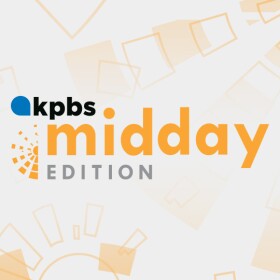La Jolla Playhouse just opened the play "Cambodian Rock Band" by UC San Diego graduate Lauren Yee. The play serves up a redemptive tale of a father and daughter finding each other amidst decades-old secrets and against the backdrop of the Cambodian rock scene of the ‘60s and ‘70s.
I fell madly in love with the music of Cambodia from the 60s and 70s after seeing the 2014 documentary "Don’t Think I’ve Forgotten: Cambodia’s Lost Rock and Roll." The film introduced me to a vibrant music movement that was tragically cut short in the mid-seventies when the incoming regime of the Khmer Rouge went beyond censorship and systematically tried to erase the music and its musicians from history. Musicians, as well as many other artists and intellectuals, were arrested and sent to what has been called re-education camps or, worse, were imprisoned and executed.
Matt MacNelly, music director for the Playhouse's "Cambodian Rock Band," discussed how the contemporary L.A./Long Beach-based group Dengue Fever got involved with the play.
"Dengue Fever plays the music of the style of the early of the 1960s, early 70s Cambodian pop music, which is sort of a psychedelic surf rock genre of music," MacNelly explained.
"What's interesting in Cambodia at the time was that it was very Western-influenced. The Prince of Cambodia was educated in France. He and his father and the whole family were very much interested in the arts and film. Contemporary Western-style music was starting to trickle into Cambodia both through colonial roots in France and through the Armed Forces Radio and the Vietnam War.
"So they were getting some American music, some French music, traditional Cambodian music that was all coming together in this sort of beautiful hodgepodge of rock 'n' roll and all that music has sort of come together and Dengue Fever is playing the music of that style but in a contemporary time. So we took some of that music that they play plus some of the traditional tunes that we've arranged on our own, but we put all of that together to kind of make our own band that's in the show called The Cyclos. It really is a miracle that we have any of this music nowadays and even further a miracle that the guys in Dengue Fever went over there [Cambodia] in the 90s and found some of these records and brought them back and then decided, 'Hey this music is kind of great.' Let's play this and let's put our own twist on it and let's honor the traditions of this music."
Lauren Yee's play moves back and forth in time as Neary (Brooke Ishibashi) heads to Cambodia for the first time and begins an investigation into a case of human rights abuse in the country's past. Her father (Joe Ngo) unexpectedly follows her back to his homeland to memories he has kept hidden for thirty years.
"The lens of the story goes through the eyes of a young woman named Neary who is a first-generation Cambodian-American," MacNelly said. "She decides to go back to Cambodia in 2008 to work on a war crimes trial against a man who ran one of these camps. So we learn slowly how her father was very much a part of this history and has been sort of keeping it from her.
"The play speaks to sort of intergenerational traumas that we might not even know about. But even if our parents try to keep something from us it may still kind of live within us, and we may still sort of know about it without knowing about it. So the play does a really good job of talking about identity and obligations, familial obligations but also as much as you may try to protect someone, the truth will come out."
MacNelly added, "As the music director I suppose I should say music plays a really important part in this play obviously. When the music is present it plays a part but also the absence of music in this play really does something unique and when it returns it's also very triumphant and wonderful."
The play is part concert and the music is riveting and essential to the story. On a certain level, I wish there had been more of that Cambodian rock music in it because it is irresistible because of the way it has imported a Western sound and then added a Cambodian flavor and then exported it back out to us.
"I think you hit the nail on the head there," MacNelly said. "I think it very much is a musical tradition that will be familiar to audiences from any background. The equipment in the band will not surprise anyone: It's a keyboard, a guitar, a bass, and a drum kit, the things we might expect from any rock band. So it sounds both familiar and yet exotic in a lot of ways to folks who might have never been to Southeast Asia or Cambodia, but it's very accessible to Western ears."
If you can't get enough of the music you can try this Spotify list of Cambodian Rocks: 60s/70s Khmer Psychedelia or check out any of the albums by Dengue Fever. But fair warning, you may get addicted as I did.








